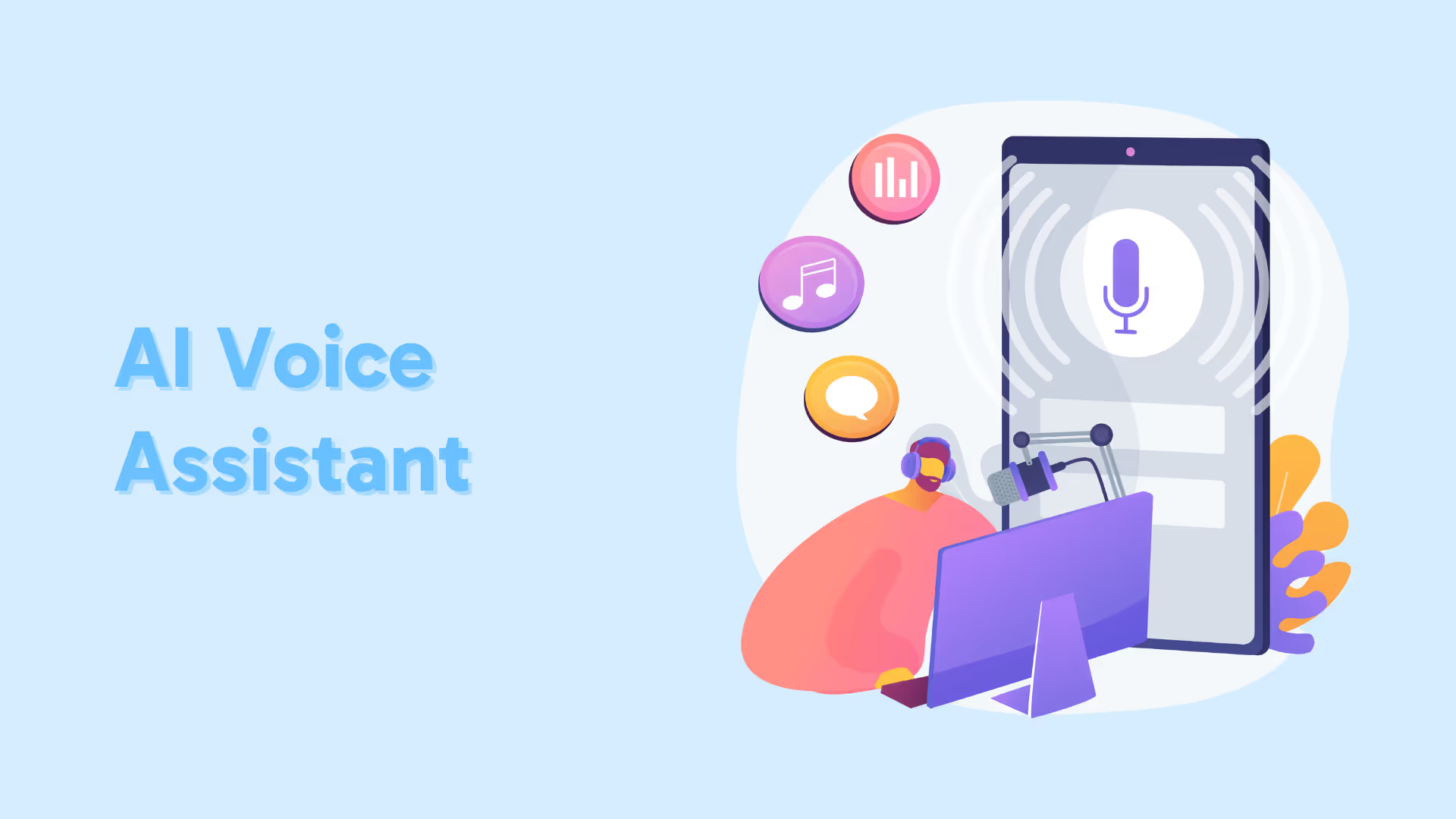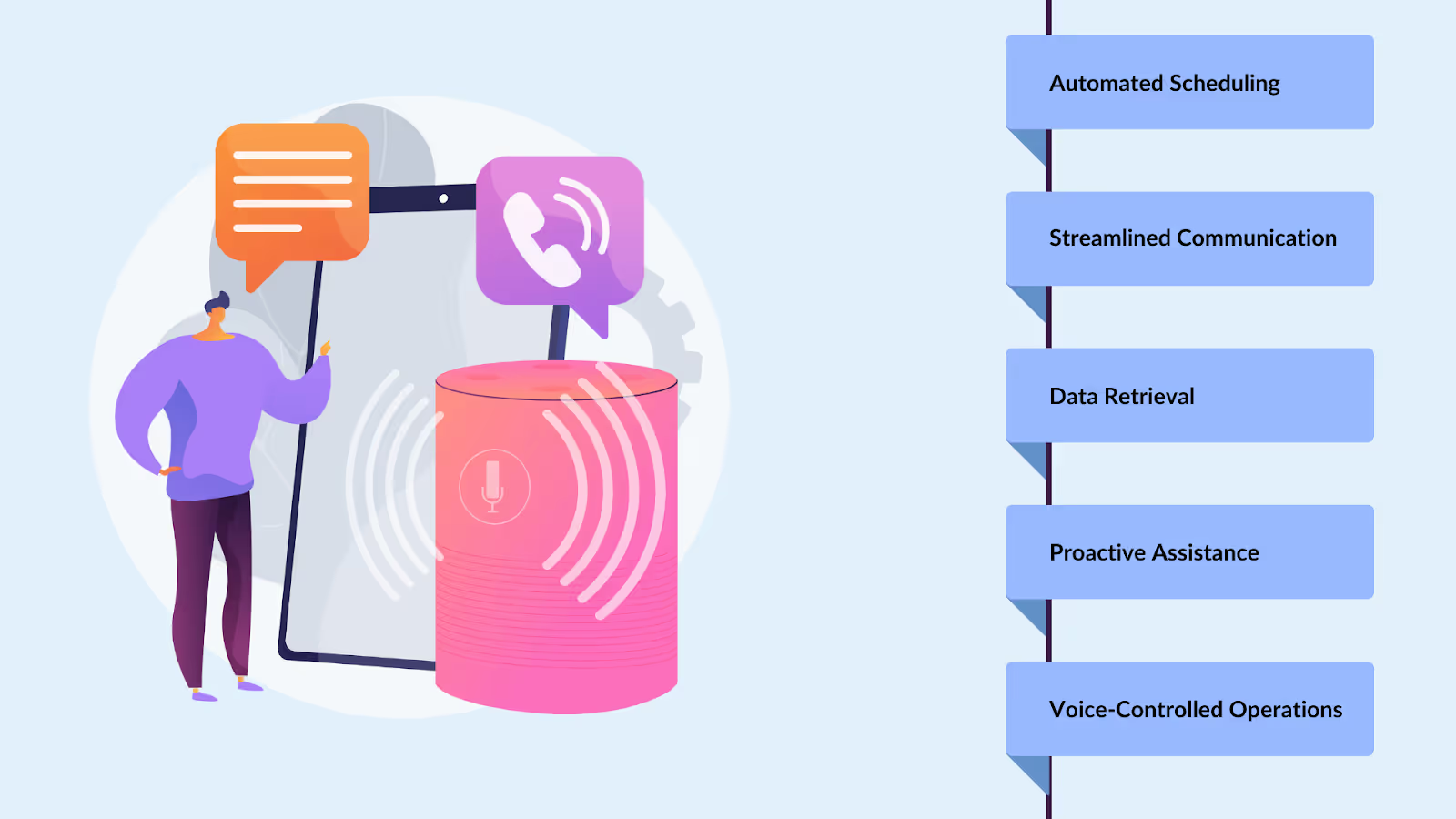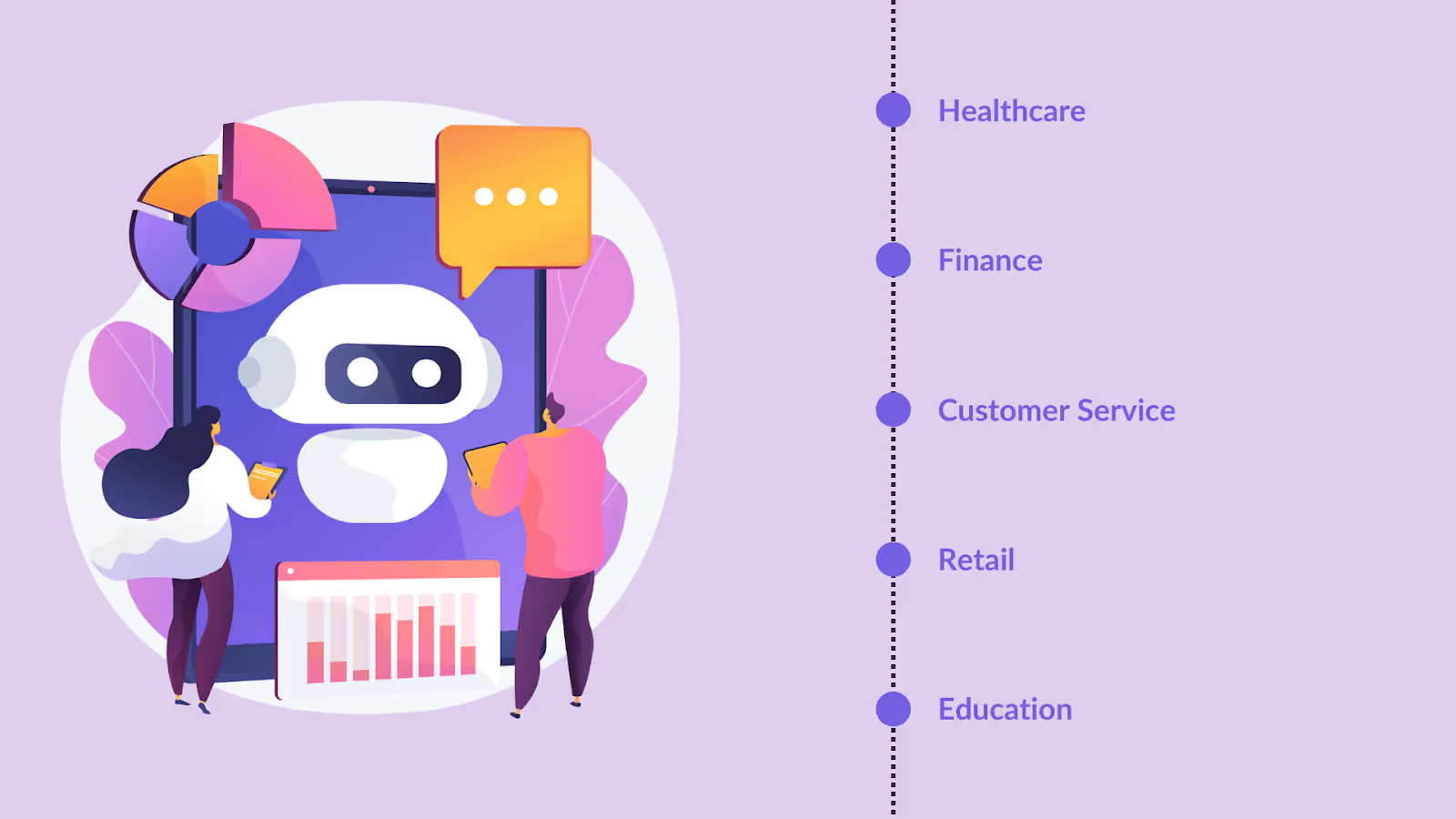AI Voice Assistant for Improved Work Productivity


Don’t miss what’s next in AI.
Subscribe for product updates, experiments, & success stories from the Nurix team.
In today’s rapidly evolving work environment, the question isn’t whether AI voice assistants are helpful but how they can transform how we work. Imagine having a digital assistant that schedules your meetings, anticipates your needs, and helps you stay ahead in your tasks, all with just a few voice commands. This isn’t just the future; it’s the present reality that businesses are increasingly adopting to stay competitive.
In this blog, we’ll explore how AI voice assistants can boost productivity, the features you should look for, and how these tools are already making a significant impact in various industries.
Understanding AI Voice Assistants
Before getting into the nitty-gritty, let’s define an AI voice assistant. These aren’t the Siri or Alexa you use at home to set timers or play music. In a professional setting, AI voice assistants are powerful tools that can analyze complex data sets, generate detailed financial forecasts, and streamline multi-step workflows, all through advanced voice commands.
- Natural Language Processing (NLP) is the engine of AI voice assistants, allowing them to understand and respond to human language. For example, Google Assistant uses NLP to interpret complex queries. It’s more than just a search tool; it’s a conversational partner that understands context.
- Learning and Adapting: These assistants learn your habits and preferences over time. Think about how your Spotify recommendations improve the more you use it, AI voice assistants work similarly, getting more efficient as they understand your workflow.
- Seamless Integration: These tools aren’t just standalone gadgets. They integrate with your existing software, your email client, CRM, or project management tools, making them an essential part of your daily routine.
- Real-Life Example: Companies like Slack have integrated AI assistants to manage internal communication. Imagine needing to schedule a meeting with your team, Slack’s AI can find a time that works for everyone, set the meeting, and even send out reminders.
How AI Voice Assistants Enhance Productivity

Let’s get to the real deal, how do AI voice assistants boost productivity? It’s not just about saving a few minutes here and there; it’s about changing your workflow.
- Automated Scheduling: You just finished a call with a client and need to schedule a follow-up. Instead of navigating your calendar, your AI voice assistant can do this. Tools like Microsoft’s Cortana can even find meeting times that work for everyone without you lifting a finger.
- Streamlined Communication: Need to send a quick update to your team? AI assistants like Amazon Alexa for Business can do that for you and ensure your message gets to the right people at the right time.
- Data Retrieval: Instead of searching through files for that quarterly report, ask your AI assistant. For example, IBM’s Watson can pull up relevant documents and data with a voice command, so you spend more time analyzing and less time searching.
- Proactive Assistance: Imagine an assistant who reminds you of deadlines or suggests tasks based on your current workload. This is not science fiction, tools like x.ai are already helping professionals manage their schedules and even send polite follow-ups to ensure deadlines are met.
- Voice-Controlled Operations: In manufacturing environments, AI voice assistants can control machinery or retrieve technical data hands-free, which is critical for safety and efficiency.
For more info on the potentials of voice technology, check out this interesting read on: Voice-to-Voice AI: The how and why of automating Customer Support
Key Features to Look For in AI Voice Assistants
So, what makes a good AI voice assistant? Here’s what to look for to get the most out of this technology.
- High Voice Recognition Accuracy: This is non-negotiable. Your AI assistant must understand and process your commands in a noisy office or a quiet home. Google Assistant’s high accuracy rate is a big win for many businesses.
- Integration Capabilities: Your AI assistant should work with your existing tools. For example, if you use CRM tools, your AI voice assistant should integrate directly so you can update records, set tasks, and even dictate notes in your CRM.
- Customizability: Every business is different, and your AI assistant should be, too. Customization options to tailor commands, workflows, and even responses can make the tool much more effective.
- Security Features: Data security is critical. Look for assistants with encryption, multi-factor authentication, and strict privacy controls to protect your business data.
- Continuous Learning: The ability to learn from past interactions makes AI voice assistants more valuable over time. This means they don’t just get better, they get better for you.
Promoting Accessibility and Inclusivity
One of the most potent aspects of AI voice assistants is their ability to make workplaces more inclusive and accessible.
- Supporting Disabilities: For employees with visual impairments, AI voice assistants like Microsoft’s Seeing AI provide real-time audio descriptions of their surroundings so they can be more independent and productive.
- Language Translation: Language barriers can be a problem in a global workplace. AI assistants like Google Assistant offer real-time translation, making communication in multicultural teams easier.
- Hands-Free Operation: Voice commands can replace physical interaction with devices, making technology more accessible for those with mobility impairments.
- Catering to Different Accents: AI voice assistants like Apple’s Siri are getting better at understanding different accents and dialects so everyone can use the tech easily.
- Personalized Interaction: Assistants that adapt to individual speech patterns make the tech more inclusive of diverse users and create a more supportive work environment.
Practical Applications Across Industries

AI voice assistants aren’t just for tech companies, they’re being used across various industries to streamline operations and enhance productivity.
- Healthcare: AI voice assistants like Suki AI are helping doctors with dictation so they can spend more time with patients and less on paperwork.
- Finance: In finance, AI voice assistants can help with expense tracking, budgeting, and even forecasting. Cleo is an AI assistant who enables you to manage your finances by providing insights and recommendations.
- Customer Service: IBM’s Watson is revolutionizing customer service by handling basic tasks and freeing up human agents for the more difficult ones.
- Retail: Retailers are using AI voice assistants to manage inventory, process transactions, and even personalize customers' shopping experiences. Walmart uses an AI assistant to help customers find products and check prices.
- Education: In education, AI voice assistants help teachers manage schedules, grade assignments, and provide personalized learning experiences for students. For example, Duolingo uses AI to provide real-time feedback to language learners.
AI Voice Assistants in Remote Work Environments
Remote work has shown us how important tools are to keep teams connected and productive. AI voice assistants have become essential in this new work model. They are no longer just nice to have; they are must-haves for productivity and communication in remote work.
- Managing Virtual Meetings: AI voice assistants like Zoom’s AI can schedule and even join meetings for you. They can also record, transcribe, and send out meeting notes so everyone is on the same page, even across different time zones.
- Task Coordination Across Time Zones: One of the challenges of remote work is coordinating tasks across different time zones. AI voice assistants like x.ai can find times that work for all team members no matter where they are and schedule meetings or deadlines accordingly.
- Streamlining Communication: In remote work, where email and messaging can become overwhelming, AI voice assistants can help prioritize and manage communications. For example, Slack’s AI can filter important messages and remind you to follow up on important tasks so you can reduce noise and increase focus.
- Supporting Work-Life Balance: Remote work can blur the lines between personal and professional life. AI voice assistants like Amazon Alexa can help set boundaries, like muting work-related notifications during personal time, so you don’t burn out.
- Facilitating Collaboration: Collaboration in remote teams can be tough, especially when it comes to sharing and managing documents. AI assistants integrated with tools like Google Drive or Dropbox can quickly find, retrieve, and share documents, making collaborative projects more seamless and efficient.
Personalized User Experience with AI Voice Assistants
One of the best things about AI voice assistants is they can be personalized to your preferences and workflow. Personalization is critical to productivity and user happiness.
- Learning User Preferences: Over time, AI voice assistants learn from you, whether it’s how you want to receive reminders or what tasks you prioritize. For example, Google Assistant learns your daily routine and can suggest actions or reminders based on past behavior.
- Customized Alerts and Reminders: These assistants can send reminders and alerts based on your schedule and needs. For example, if you always forget to submit reports, your AI assistant can learn this habit and remind you proactively.
- Adaptive Workflows: AI voice assistants can suggest workflow optimizations based on your habits. For example, if you always handle emails at a particular time, the assistant can suggest scheduling meetings at other times to maximize your productivity.
- Contextual Assistance: By understanding the context of your tasks, whether in a meeting or focused on a specific project, the assistant can offer relevant help, such as pulling up related documents or suggesting the next step.
- Dynamic Adjustment: As your habits and needs change, AI voice assistants adjust their interactions and suggestions to stay helpful and aligned with your current workflow.
Challenges and Ethical Considerations
Integrating AI voice assistants into the workplace comes with challenges and ethical considerations. As these tools become more ingrained in our daily workflows, addressing these concerns is essential to ensure responsible usage.
- Data Privacy Concerns: AI voice assistants are powerful because they process so much data. But that raises significant privacy concerns. Users must know what data is being collected and how it’s used.
For example, Amazon is getting flak over how Alexa stores voice recordings, so there’s a growing demand for transparency and user control over data.
- Bias in AI Decision-Making: AI can unintentionally perpetuate biases in the data it was trained on. That’s a big issue, especially in HR or customer service, where AI-driven decisions can impact people’s lives. Companies like IBM are working on ways to mitigate those biases, but it’s an ongoing problem.
- Transparency: AI systems, including voice assistants, need to be transparent. Users need to know how they work and be able to question or override those decisions if required.
For example, Google is progressing by explaining how AI models work and giving users tools to review AI-driven decisions.
- Over-Reliance on AI: As AI becomes more ingrained in our daily workflow, there’s a risk of over-reliance, where critical thinking and decision-making skills atrophy. Balancing the convenience of AI with the need for human judgment is vital, especially in industries that require a nuanced approach.
- Ethical Use of AI: Companies need to ensure their use of AI aligns with broader ethical standards. That means respecting user privacy, not creating or reinforcing biases, and using AI to enhance rather than replace human roles where empathy and creativity are required.
AI Voice Assistants as a Competitive Advantage
Adding AI voice assistants to your business strategy is a significant competitive differentiator, especially in industries where speed, efficiency, and customer experience matter.
- Operational Efficiency: By automating repetitive tasks, AI voice assistants free up employees to focus on strategic initiatives. Accenture has reported an enormous productivity boost from using AI assistants to manage routine operations, resulting in faster project completions and lower operational costs.
- Enhanced Customer Service: AI voice assistants like IBM Watson improve customer service by handling basic queries so human agents can focus on complex issues. This improves customer satisfaction and streamlines the service process, giving companies a competitive edge in customer relationships.
- Faster Decision-Making: With real-time data processing, AI voice assistants can provide instant insights and recommendations so you can make decisions faster. This ability to react to changing conditions is priceless in fast-paced industries like finance and tech.
- Scalability: As businesses grow, AI voice assistants can scale with them, managing increasing workloads without the need for a proportional increase in staff. Salesforce’s Einstein Voice is an example of how sales teams can manage larger pipelines with the same level of personal attention and care.
- Innovation Leadership: By adopting the latest AI technologies, businesses can position themselves as leaders in innovation. This attracts top talent and builds a brand reputation of being at the forefront of technology, which can be a significant differentiator in competitive markets.
Innovative Capabilities and Future Trends

The capabilities of AI voice assistants are evolving rapidly, and staying ahead of these trends can give you a significant competitive edge.
- Generative AI: Imagine needing a draft of an email or report; your AI voice assistant can now do that for you, saving hours of writing and editing. Companies are already using Jasper AI to generate high-quality content at scale.
- Integration with IoT Devices: AI voice assistants are integrated with IoT devices. So your assistant can now control not just your digital tasks but your physical environment too, like turning on the lights or adjusting the temperature in your office based on your preferences.
- Advanced Predictive Analytics: The future of AI voice assistants is even more predictive. For example, they might suggest tasks or meetings based on your history so they can become proactive in your productivity.
- Deep Personalization: Assistants will get even more personalized based on their behavior, preferences, and mood, making them feel more human and intuitive.
- Industry-Specific Tools: Expect to see more AI voice assistants in industries like healthcare, where they can help with patient management, or finance, where they can help with compliance and reporting.
Conclusion
AI voice assistants are no longer just an added bonus; they are a must-have that can change how you do business, increase productivity, improve customer service, and give you a competitive edge. But like any powerful technology, AI comes with responsibilities. Businesses must address the ethical implications, ensure data security, not over-rely on AI, and balance the efficiency gains with human oversight.
By thoughtfully integrating AI voice assistants into your business, you can unlock new levels of productivity and efficiency and set your business up for long-term success in a digital world. The future of work is here, and with the right approach, AI voice assistants can be a key part of your strategy to thrive in this new world.
Boost your team's productivity and customer satisfaction in one move with Nurix AI's smart agent assist.

Don’t miss what’s next in AI.
Subscribe for product updates, experiments, & success stories from the Nurix team.









